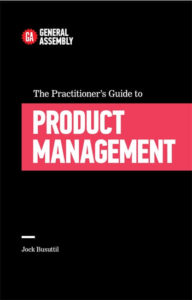
PRODUCTHEAD: What if …?
PRODUCTHEAD is a regular newsletter of product management goodness,
curated by Jock Busuttil.
banana product #
every PRODUCTHEAD edition is online for you to refer back to
tl;dr
Scenario analysis frees you to consider how things would be different without limiting constraints
Innovation can occur when challenging received wisdom on what is possible or not
Scenario analysis can also help you to consider alternate strategies in a dynamic market
hello
Interesting things start to happen when we ask the question ‘what if?’

For years Marvel has had an anthology of stories under the banner “What If …?” Each explores what might have happened to familiar characters and storylines if one key detail or decision had been different. It gives creative license to the writers and artists to subvert the status quo, which in turn allows them to tell new stories, which would otherwise never have emerged.
Impossible! Ridiculous! #
In product management, we sometimes encounter companies or whole markets that discount an entire path of innovation because there is a long-standing constraint that nobody bothers to question any more. The constraint is so engrained that people will dismiss out-of-hand the thought of changing or removing it. Impossible! Ridiculous!
For example, last week I mentioned how a team of academics figured out that fingerprints belonging to the same person are not, in fact, unique. Because their findings went against a long-standing belief, the team struggled to have their research paper published. Some editors simply dismissed their findings out-of-hand: “It is well known that every fingerprint is unique,” one anonymous expert reviewer remarked.
Imposs… Oh wait, you’ve done it anyway #
With the benefit of hindsight, we can find other examples. A few decades ago it would have been crazy to ask ‘what if everyone had access to the world’s information via a supercomputer in their pocket?’
Or a couple of decades or so ago, ‘what if we could reliably reuse rocket boosters rather than let them burn up or fall into the ocean?’
Or even just a couple of years ago, ‘what if access to artificial intelligence was cheap and ubiquitous?’
‘What if’ lets us consider unlikely scenarios. But they’re only unlikely because they rely on a crazy idea, or an as-yet unknown technology. And the thing is about crazy ideas and unknown technologies is that they’re only crazy and unknown until they aren’t.
Limiting constraints #
When there’s a fundamental limiting constraint on a market or system, it can be a worthwhile exercise to call them out and explore what might happen if that constraint were removed.
You could ask relevant questions of your product, market or ecosystem such as:
What if the limited supply of this thing became unlimited?
Storing information on physical media such as paper, film or magnetic tapes used to present a practical upper limit on capacity until digital storage effectively negated that limit.
Also, in a very short timespan, access to generative artificial intelligence has gone from very niche and limited to freely available to all. We’re still in the midst of the market disruption this has caused.
What if this manual process could be automated?
Systems that rely on human intervention at some point are limited in throughput (and possibly accuracy) by the manual intervention. However, people are generally better at adapting and improvising on-the-fly when faced with an unexpected situation than machines.
Automation generally means being able to perform the given task at least as quickly as people would (although often many times faster), ideally while preserving or improving accuracy and flexibility. With the constraint removed, automation can highlight the next bottleneck in the system.
What if the cost of this commodity became free or negligible?
We often take for granted that certain widely-available amenities have a non-negligible cost associated with them. For example, access to basic utilities (electricity and fresh water) can have a knock-on effect on a variety of socio-economic factors, such as health, education, the environment and politics. What if housing was free? What if public, private and commercial transportation had negligible cost?
What if something that should never happen, happened?
In medical care, they use the term ‘never events’ to describe the kinds of medical error that should never happen, yet still do. These might include conducting the wrong surgical procedure on a patient. Medical practices routinely consider how they should identify, investigate and respond to an occurrence of a never event.
What if someone started offering an equivalent product to yours for free?
Many technology companies have been blindsided by a ‘good enough’ equivalent to their proprietary product being made freely available, often as an open source offering. How do you compete with free?
Zeus Technology, the first company I worked for, was famed for having the world’s fastest web server. It even powered eBay’s search engine for a while. Around the same time, a free and open source web server called Apache HTTP Server was becoming increasingly popular.
At the time, it wasn’t as fast as Zeus’s proprietary web server, but for the vast majority of users, it was good enough and free. Zeus lost its market share and moved on to adjacent technology.
What if this consumable became reusable?
SpaceX has notably challenged and overcome several long-standing constraints in the rocketry industry, including:
that costly rocket boosters could not be retrieved and reused reliably; and
that launch pads could not be ‘turned around’ for another launch in a short period of time.
By successfully pioneering rocket stages they can reuse for multiple launches, SpaceX has greatly reduced its cost per launch, meaning it can undercut its traditional competitors dramatically. Coupled with a frequent launch cadence, SpaceX is now the dominant player in delivering payload to orbit.
What if this was a platform, not a one-off project?
Amazon considered this question with Amazon Web Services, as did Google with Android, Tesla with their Supercharger network, and so on.
Platform providers choose to solve a problem affecting them in a way that not only meets their own needs, but also those of their customers, partners, and even competitors. In doing so, they exert a degree of control over the ecosystem, can detect and adapt more easily to market changes, and make it harder for competitors to dislodge them from their dominant position.
Practical ‘what if’ exercises for your team #
A practical exercise you can do with your team to cope with uncertainty is to try some scenario planning. When you think about how you will plan a foreign trip with your friends, you might anticipate potential problems and work out alternative routes or means of travel just in case (plan B, C, D etc.). In effect this is scenario planning.
With your team, you can examine how users experience your product or your service blueprint. Look at bottlenecks, steps that incur high cost, manual processes and so on.
Using the prompts above (and others), ask your team what would happen if relevant scenarios were to occur, then figure out what you’d do in response. You should absolutely challenge received wisdom and long-standing constraints by considering ‘crazy’ or ‘impossible’ scenarios, or by conjuring up a magical new technology that doesn’t yet exist.
However, to keep things vaguely practical, ask what the group’s confidence is for the scenario to occur (and what evidence you have to believe that) so that you don’t waste effort on highly unlikely scenarios. There’s always one person who suggests a black hole could open up down the street from you.
Final thoughts #
It would be great if our foresight was as accurate as our hindsight, although that would probably take the fun out of things. It’s really hard to predict the future, which is why it can be helpful to compartmentalise how you identify possible market disruptions using ‘what if’ scenarios for aspects of your product’s ecosystem.
You should also have reasonable expectations of this exercise. After all, very few people predicted how disruptive generative AI was going to be before it happened. Even fewer were able to prepare for it. Very few indeed were ready to capitalise on it. Have fun :-)
Speak to you soon,
Jock
what to think about this week
Scenario analysis
Imagine that you’re facing a really important decision. It’s one that could fundamentally affect your personal life, or determine the future of your business.
No one has a foolproof vision of the future, and even if your instincts are good, the outcomes that you predict could be disrupted by a range of different factors.
[MindTools]
How can you be more innovative? Try the “What If” method.
What are your biggest barriers to innovation? Usually, it’s rules—and not just any rules, but sacred rules: those norms and processes in your business that you’d love to kill but just can’t. Every company has them.
Make innovation possible even in the most rigid of companies
[Duncan Wardle / ID8]
recent posts
Always have a plan B
Have you ever wondered why product managers say “it depends” quite so often?
Always seeking the best possible compromise
[I Manage Products]
Billion-dollar platforms — how they did it
I was asked recently whether platforms will conquer the world. My view? They already have. In this article I share how they’ve done it, and how you can successfully bring your own platform to market.
[I Manage Products]
How can I keep track of all these product metrics?
Hi Jock,
Do you have any advice on productivity tools for tracking product metrics? I’m seeking guidance on streamlining feedback and metrics management. Juggling continuous discovery insights, team feedback, and metric tracking has become increasingly overwhelming.
Sometimes it’s difficult to know where to start
[I Manage Products]
can we help you?
Product People is a product management services company. We can help you through consultancy, training and coaching. Just contact us if you need our help!
Helping people build better products, more successfully, since 2012.
PRODUCTHEAD is a newsletter for product people of all varieties, and is lovingly crafted from a machine that noms food scraps.


Leave a Reply